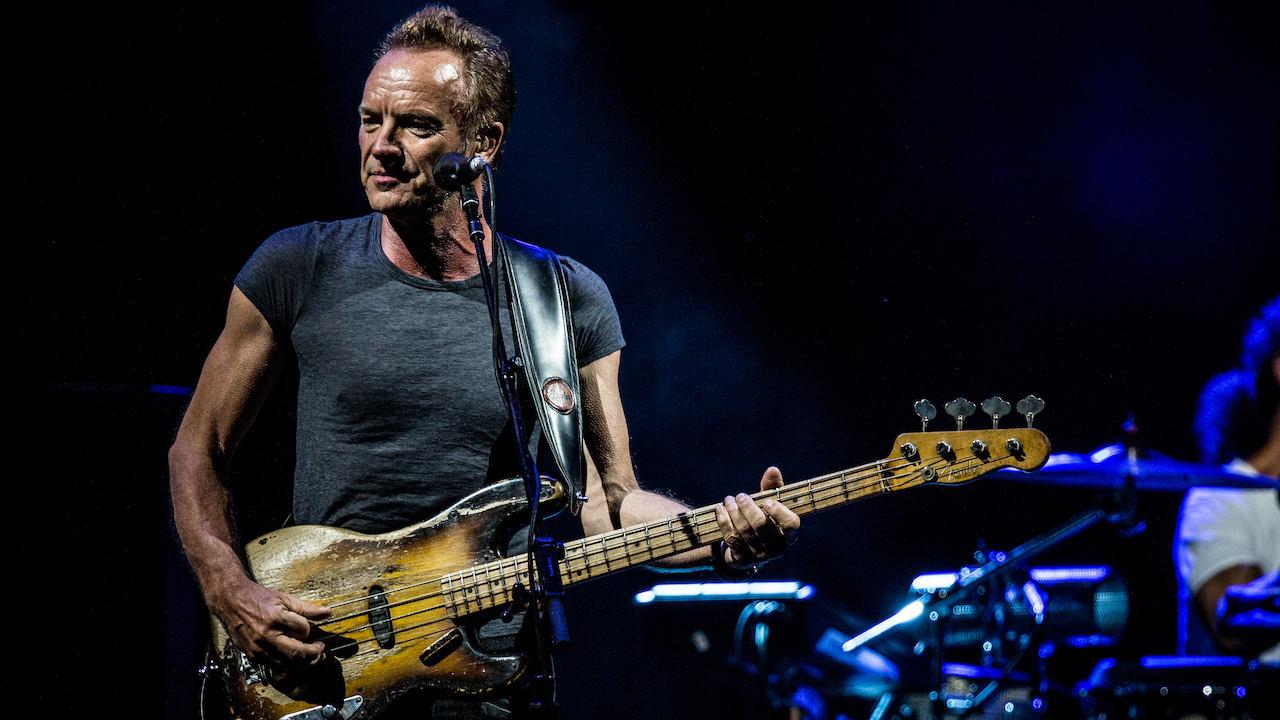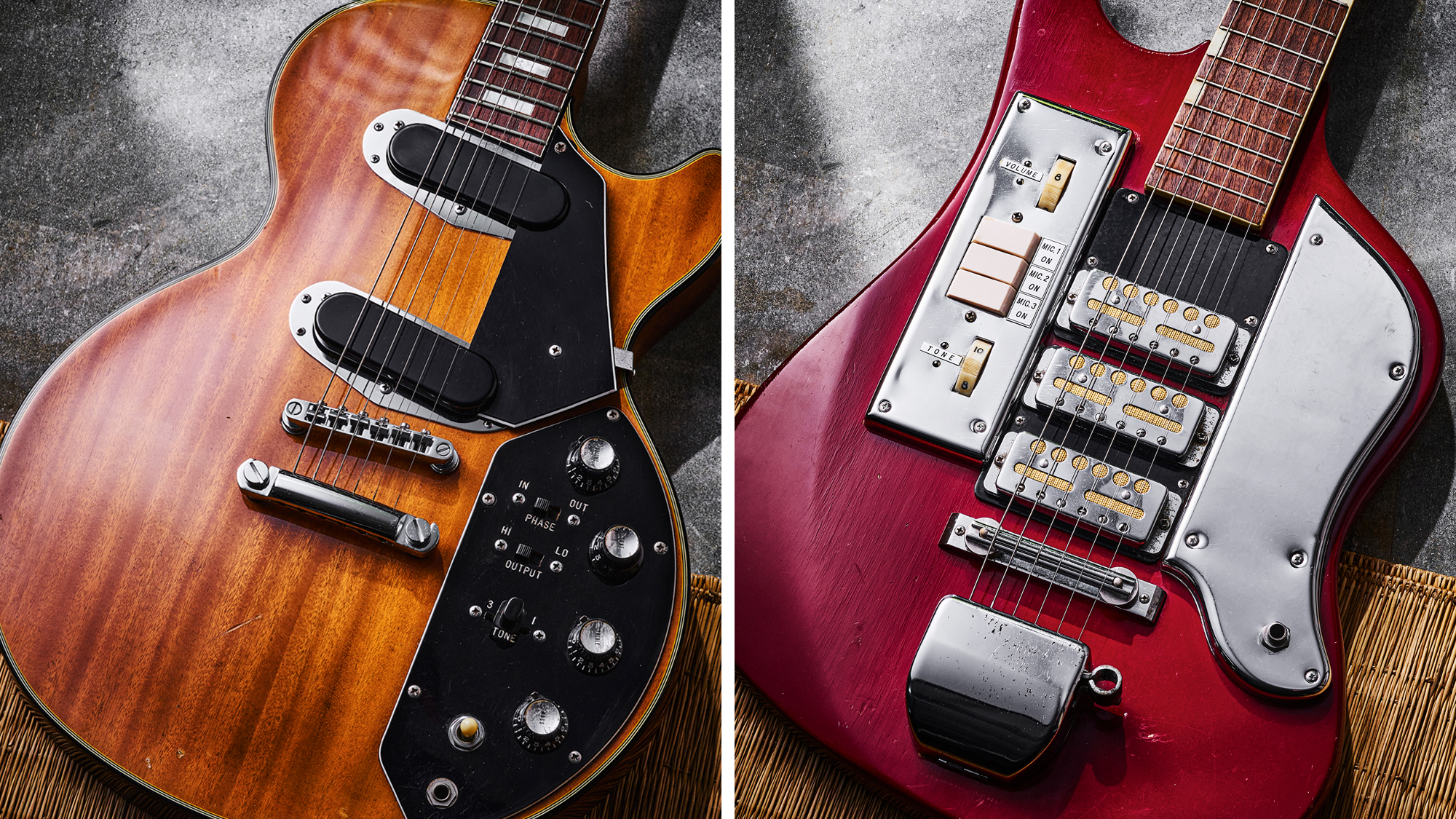“Am I a good bassist? I’m a f**king good bassist!” Sting on bass playing, Cream and his “battered looking” P-Bass
From the Bass Player Archive: An interview with Sting

You may know him as the guy who fronts The Police, or the solo artist who sold a gazillion copies of songs like Fields Of Gold, Russians, Englishman in New York and all the other tunes that are now in your head because you just read their titles. Or you may recognise him for acting in Quadrophenia, Dune, Lock, Stock And Two Smoking Barrels and what have you. Your kids know him as the funny levitating guy from Bee Movie. Everyone knows Sting for something.
In bass world, though, we know the guy as Gordon Sumner, the ex-teacher born in 1951 who played in jazz and fusion bands before forming The Police in 1977, playing whopping great bass guitar parts and being a massive rock star. Fretted, fretless, double bass, eight-string – the man was unstoppable on bass, filling up the empty spaces within the trio format of The Police with a variety of lines, from the simple to the finger-threateningly complex.
After The Police split in 1984, Sting dominated the 1980s and '90s with a sequence of rock and jazz albums that we all know, beginning with The Dream Of The Blue Turtles in 1985 and finishing up with Brand New Day in '99. After that he moved in different, less popular directions, doing the R&B-influenced Sacred Love in 2003, plus classical and folk releases after that. His 2016 album, 57th & 9th, saw a return to rockist form.
This interview from the Bass Player archives took place in October 2016, following the release of the album's lead single, I Can't Stop Thinking About You.
Your tech, Danny Quatrochi, sent us the details of your bass rig.
“That's good, because I never really look behind me. I'm kind of busy up front, so I trust Danny to get me the right equipment and the right strings, but one thing I'm particular about is my P-Bass, which I've had for a quarter of a century. It's from 1957, which is almost as old as me. It's very, very battered looking, but it has a growl that a modern bass guitar simply does not possess. I imagine Leo Fender himself put it on a lathe to make it.”
What's your backup bass when you tour?
Get The Pick Newsletter
All the latest guitar news, interviews, lessons, reviews, deals and more, direct to your inbox!
“I've got a '54 P-Bass which I don't use as often, and so is less responsive, but it's still a beautiful bass. I don't have that many instruments.”
You've been through a lot of basses over the years, though.
“Yeah. I started with a Fender Jazz, which I still have. I bought it in Newcastle for about 150 quid. It was a lot of money back then. I don't know what it's worth now. Then there was Ibanez, Hamer.. what was the one with no headstock?”
Steinberger?
“Steinberger... but I found my true love eventually.”

Are you equally happy playing guitar and bass?
“Yeah, I'm happy on both. I mean, I started as a guitar player and continued to play guitar, mainly acoustic guitar, but the bass seemed to offer a kind of quiet heroism. And also, playing bass and singing at the same time is much different to strumming along four in the bar, you know. So learning how to do that was important, because my mentors were Paul McCartney and Jack Bruce and Phil Lynott, who could do it. And I enjoy it.”
The obvious example of a tricky bass part is Spirits In The Material World.
“A lot of very sophisticated musicians have no idea where one is in that song! Which makes me very happy. Where the fuck is one? It doesn't matter.”
You had chops from an early age, didn't you?
“I was playing with jazz musicians, and I was playing Stanley Clarke lines from Return To Forever songs. When Jaco came, about that time, he totally recalibrated what it was to be a bass player. He could play Charlie Parker chromatic lines on the bass guitar: nobody had thought of that before.”
Did you sit down and figure Jaco's stuff out?
“Yeah. In fact, I remember when I got Teen Town, which is an amazing piece of bass playing. It really is. In soundcheck I'd just sit and play it, because it's so fun. I knew Jaco. He used to come and see The Police when we played in Miami.”
What kind of guy was Jaco?
“A beautiful man. Really, a beautiful cat. A little crazy. He would call me at four in the morning in London and say 'Hey man, how are you doing?' And I'd say 'Jaco, it's four in the morning!' And he'd say, 'no, it's only like 11pm!' And I'd say, 'you're in Miami!' His death was appalling. Unnecessary. I'd love to know what he'd be doing now, if he survived his problems. It would have been remarkable.”
Do you ever play slap bass?
“Not really. I play with my thumb and two fingers, like an apoyando style. Most of the work is done with the thumb and that goes up and down the neck. I'm also pulling a lot. I was with Tony Levin one summer and he said he'd never noticed how I play, and that it was odd! I told him to try it, and he did! The great Tony Levin... I could see him practising using two fingers and a thumb.”

You play both fingerstyle and with a pick.
“Playing with a pick down near the bridge really helped The Police. We were only a trio, and I needed the bassline to be very clear, rather than rumbling and vague. Often on record I would double the same part on guitar as well, so it was very clear what we were doing. I also like rumbly bass players, you know: I love Hendrix's bassists, that kind of atmospheric thunder that they created.”
Do you play five-string?
“No! It confuses the hell out of me. If I need a low D I'll tune down, but I don't want another string there. Having played the lute for a while, with 26 strings, I don't want the same issue when I'm trying to sing and lead a band. Four is enough. I don't feel the need to be flash. I think the band appreciate that.”
Would you say you're a good bass player?
“I could hold down a job. I've worked in an orchestra pit in a theatre. I've backed cabaret. I've backed comedians and strippers. I've worked on a cruise ship. I've played Dixieland jazz. I've played in a big band. Yeah, I'm a fucking good bass player! I had a wider musical education than most rock stars, who just play AC/DC riffs. I think that feeds into my process. I'm proud of all that work I did.”
Which bass players did you admire when you were starting out?
“One of the first bands I ever saw was Cream. I also saw the Jimi Hendrix Experience when I was 14, but then I saw Cream, and they kind of turned my head around. It was a very formative experience to see those two bands. And then I was in The Police, so the trio thing was prevalent.”
Do today's kids have an equivalent band like Cream to look up to?
“Don't ask me, I don't know! But I was always watching these trios, and then on a Saturday night I'd go and play with guys who were in their eighties, playing piano, drums and old-time dance music. You'd play standards for an hour non-stop. The only clue you got about what key would be next was a gesture with the fingers for the accidentals. So busking was important for me. I'd hear something for the first time and then be able to play it.”
I've been listening to a few songs by your pre-Police fusion band, Last Exit.
“Really? How did you find Last Exit?”
On YouTube, they're all there.
“Really? That terrifies me.”
How do you define yourself first and foremost? As a singer-songwriter, bass player, businessman...?
“My passport says musician, which I'm very proud of. I think it's a noble profession. To make a living without harming anybody, or exploiting anybody. I'm proud of my profession.”
Does inspiration for songwriting come as easily as it ever did?
“The music comes easily. I have a good relationship with my musicians. We know how to react to each other's ideas, and I can pretty quickly carve that into a song form. The inspiration for lyrics is difficult. I'm not terribly angry about many things, so how do you find inspiration? You're searching for a pathway, a muse, a story. That's difficult, but once I start, what's going on in the world – whether I want to write about it or not – unconsciously feeds into the writing process.”
Do you ever get sick of touring?
“I've toured all my life, so I'm used to it. You know, it's pretty comfortable out there, in the best hotels, and the best mode of travel. You walk out in front of thousands of people and they're all pleased to see you, and nobody asks for their money back. It's great!”
Do you have a long-term plan?
“Yeah. I want to keep making my living as a musician, and be better. I can do rock music. I know how it works, but I'm also interested in the upper partials of a chord and the way harmony works. You can do both. It's limitless.”
Joel McIver was the Editor of Bass Player magazine from 2018 to 2022, having spent six years before that editing Bass Guitar magazine. A journalist with 25 years' experience in the music field, he's also the author of 35 books, a couple of bestsellers among them. He regularly appears on podcasts, radio and TV.
“I asked him to get me four bass strings because I only had a $29 guitar from Sears”: Bootsy Collins is one of the all-time bass greats, but he started out on guitar. Here’s the sole reason why he switched
“I got that bass for $50 off this coke dealer. I don’t know what Jaco did to it, but he totally messed up the insides!” How Cro-Mags’ Harley Flanagan went from buying a Jaco Pastorius bass on the street to fronting one of hardcore’s most influential bands















